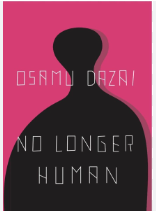“Don't write your life.”
More than useless, it’s impossible advice.
No matter how hard we try as writers, pieces of our personality—our biases, dislikes, fears, and aspirations—make it into our writing. It doesn't matter if you're an author who deals strictly with the fantastical world, or if you're a writer who believes that horror is your calling.
It doesn't matter if the books you write are set in a world thousands of years into the future where spaceships are the most common form of transportation or thousands of years into the past where the number of camels one possesses is a sign of wealth. It doesn't matter if it's an imagined world or a real one.
When we write, fragments of our soul stain our work like ink blotches on parchment. This elusive essence—the only unintentional aspect of our writing—coagulates, condensing into what readers will eventually call our writing style.
Study the writing style; understand the author. Don't write your life? Osamu Dazai begs to differ.
One could argue that all writings by the Japanese author were autobiographical. The novelettes, the short stories, and the full-length novels. The numerous characters and the different settings. The struggles, the triumphs, the failures. The pain.

I used to see "No Longer Human," a pseudo-autobiographical book by Osamu Dazai, as a long suicide note; the only one of his works that really captured his struggle with life. With time, and with further analysis of his other works, I began to see that all of Dazai's writings hinted at his self-destructiveness.
Osamu Dazai wrote his life. Not like an old man, writing his past under a dim light with a fountain pen and leather-bound journal. No. Osamu Dazai's writing is akin to that of a cameraman, an omniscient narrator, telling a story he'd rather forget.
The writing of "No Longer Human" is fiercely controlled. Every comma and period obstinately placed, every word a careful stencil. The book is mesmerizing; its premise is a little less than a psychedelic, pulling you into the world of a man divested from humanity.
Another translation of the Japanese title, "人間失格" is "Disqualified as a Human Being." I prefer this rendition. I feel like it lays the premise of the book bare. A boy, then a young man, struggling to understand the most basic of all social cues. An isolated man, standing on one side of a vast chasm, while the rest of humanity stands on the other.
The book explores the various ways in which the protagonist tries to bridge this gap. Tomfoolery, alcoholism, harlotry, drug abuse, and self-directed violence.
I don't and will not recommend this book to anyone. I only ask people if they've read it and if they have, what they thought about it.
Shuji Tsushima is the person. Osamu Dazai is the pen name. Oba Yozo is the character.
Layers separate us, the readers, from Shuji Tsushima. Yet, by reading any of his works—"No Longer Human" in particular—we begin to understand Tsushima. Our understanding, however, is cut short. Tsushima died by suicide, six days away from his 39th birthday.
The first two lines of "No Longer Human" are:
"Mine has been a life of much shame.
I can't even guess myself what it must be to live the life of a human being."
What a book.
